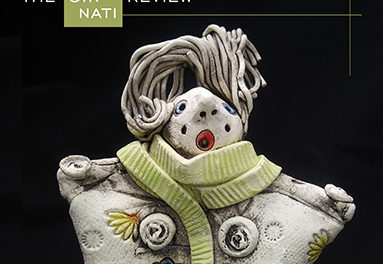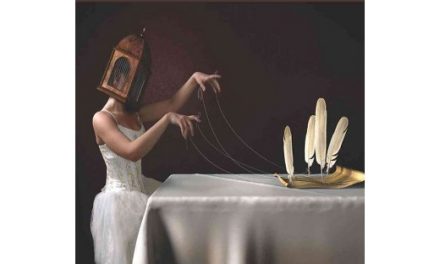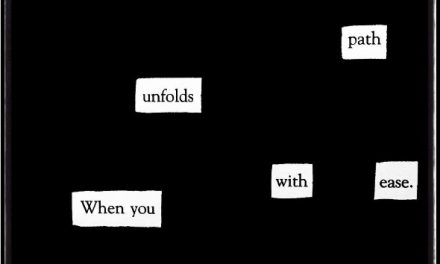Welcome back, CR-ers. Get ready for the second part of our interview with UC’s Emerging Writers Ben Loory, Danielle Evans, Ron Currie Jr., and Caitlin Horrocks, as they discuss “The Writer as Reader,” moderated by Professor Jim Schiff. In this installment, you’ll find out how Ben Loory’s Brady Bunch/Virginia Woolf childhood affected his work and how Danielle Evans’s obsession with the educational video How to Raise a Street-Smart Child taught her about the power of danger.
Jim Schiff: What kinds of things are you attentive to on the page? How have you changed as a reader from when you were younger, and how have your reading tastes changed?
 Horrocks: I enjoyed The Hunger Games. There are books that I want to be entertained by and I want to respect and enjoy what that author does well. But if the writer is not paying much attention to their sentences, or if their language is just really clunky, I find it hard to turn off or ignore that. It’s like nails on a chalkboard. I think there are now multiple ways in which I read. I read as a teacher or an editor or a judge of a contest. Reading for pleasure, unfortunately, gets pushed to the side.
Horrocks: I enjoyed The Hunger Games. There are books that I want to be entertained by and I want to respect and enjoy what that author does well. But if the writer is not paying much attention to their sentences, or if their language is just really clunky, I find it hard to turn off or ignore that. It’s like nails on a chalkboard. I think there are now multiple ways in which I read. I read as a teacher or an editor or a judge of a contest. Reading for pleasure, unfortunately, gets pushed to the side.
Evans: People say “MFA programs might not make you a better writer, but they’ll make you a better reader.” I’m sorry to say that is a lie. When you start to only see a book as a piece of work, you see all the puppet strings in them. I like to read to be immersed in another world, and the more you get tangled up in the puppet strings, the harder it is to do that. When I have to work to think about things to say about a book, when I’m just immersed in the world of it, that’s when I know a book is really beautiful. I think it’s important to get to that state. . . . I like the books that remind you of the sheer magic of being immersed in a novel.
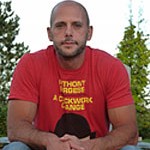 Currie: When I was younger, I read with that immersion you’re talking about. And as I get older, I find it harder and harder to access. At first I thought it was a function of age. Maybe I’m getting too cynical or I’m reading too critically, but I’ve become convinced recently that it has more to do with the din of modern life, particularly the internet. Everything I take in on the internet, it’s all very brief; it’s all encapsulated. It requires very little of me. I had an experience this summer where my girlfriend and I rented a cabin off the coast of Maine and there was no choice but to disconnect. And within two days, I found myself reading quite naturally. I had that experience of reading as I did when I was younger, which was I look up three hours later and I’m three-quarters of the way through a book. So for me, it’s not my critical faculties getting in the way, though that does happen. The primary problem is that it’s too goddamn busy all the time. It requires a good deal of discipline when I come back to the real world. I realized I have to be careful what I expose myself to and how often, if I want to retain that pleasure, which is really why I read and write: to re-create that total immersion that I certainly got when I was a kid and now more rarely, but that I enjoy just as much.
Currie: When I was younger, I read with that immersion you’re talking about. And as I get older, I find it harder and harder to access. At first I thought it was a function of age. Maybe I’m getting too cynical or I’m reading too critically, but I’ve become convinced recently that it has more to do with the din of modern life, particularly the internet. Everything I take in on the internet, it’s all very brief; it’s all encapsulated. It requires very little of me. I had an experience this summer where my girlfriend and I rented a cabin off the coast of Maine and there was no choice but to disconnect. And within two days, I found myself reading quite naturally. I had that experience of reading as I did when I was younger, which was I look up three hours later and I’m three-quarters of the way through a book. So for me, it’s not my critical faculties getting in the way, though that does happen. The primary problem is that it’s too goddamn busy all the time. It requires a good deal of discipline when I come back to the real world. I realized I have to be careful what I expose myself to and how often, if I want to retain that pleasure, which is really why I read and write: to re-create that total immersion that I certainly got when I was a kid and now more rarely, but that I enjoy just as much.
 Loory: I think ironically I’m more accepting of certain kinds of books as I’ve gotten older. I find something to like in almost everything. I’m always just looking for something that’s different from anything else. I’m always pushing myself into new genres. The last month I’m reading a lot of cyberpunk from the eighties and reading early-twentieth-century Japanese literature, and I love all of it. When I was younger, I was obsessed with finding out what the great books were and who was the best writer. And I would compare each book to the one I just read. “Oh, okay. Now I’m reading Hemingway, and now I’m reading Faulkner. Is Light in August better than The Sun Also Rises? Yeah . . . I think it is.” There was always this pyramid I was building inside of my head. It was all judgmental and unpleasant. Now, somehow, that’s all gone and it’s fun just reading as much and as widely as I can.
Loory: I think ironically I’m more accepting of certain kinds of books as I’ve gotten older. I find something to like in almost everything. I’m always just looking for something that’s different from anything else. I’m always pushing myself into new genres. The last month I’m reading a lot of cyberpunk from the eighties and reading early-twentieth-century Japanese literature, and I love all of it. When I was younger, I was obsessed with finding out what the great books were and who was the best writer. And I would compare each book to the one I just read. “Oh, okay. Now I’m reading Hemingway, and now I’m reading Faulkner. Is Light in August better than The Sun Also Rises? Yeah . . . I think it is.” There was always this pyramid I was building inside of my head. It was all judgmental and unpleasant. Now, somehow, that’s all gone and it’s fun just reading as much and as widely as I can.
Schiff: Who are your literary influences, your “constellation of writers'” in your mind?
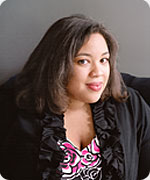 Evans: Someone pointed out to me that there is an undercurrent of danger in my work. My mother was briefly engaged to a cop who had given me as a birthday present a video cassette called How to Raise a Street-Smart Child. I was a very obsessive child, and I watched it every night for like . . . years of my life. It’s all the terrible things that could happen to you as a child. It’s weird the things you’re influenced by. But as for writers, when I need to be reminded that certain rules were meant to be broken, I go back to Baldwin a lot. There are things he does with the sentence that get away with all kinds of things. [As a reader], there’s questions you ask about plot and point of view, and you ask those questions generally because something else isn’t working, something else is making you question the voice. But with Baldwin’s characters, we don’t ask how he knows the details of his dead brother’s wife, because we just want to hear him keep talking. . . . Junot Diaz was the first contemporary literature that sounded like it came from a world I recognized. I thought if I wanted to write about African American characters I had to go back to slavery. But this was serious literature that sounded like the world that I lived in. I didn’t know until then you could do that.
Evans: Someone pointed out to me that there is an undercurrent of danger in my work. My mother was briefly engaged to a cop who had given me as a birthday present a video cassette called How to Raise a Street-Smart Child. I was a very obsessive child, and I watched it every night for like . . . years of my life. It’s all the terrible things that could happen to you as a child. It’s weird the things you’re influenced by. But as for writers, when I need to be reminded that certain rules were meant to be broken, I go back to Baldwin a lot. There are things he does with the sentence that get away with all kinds of things. [As a reader], there’s questions you ask about plot and point of view, and you ask those questions generally because something else isn’t working, something else is making you question the voice. But with Baldwin’s characters, we don’t ask how he knows the details of his dead brother’s wife, because we just want to hear him keep talking. . . . Junot Diaz was the first contemporary literature that sounded like it came from a world I recognized. I thought if I wanted to write about African American characters I had to go back to slavery. But this was serious literature that sounded like the world that I lived in. I didn’t know until then you could do that.
Currie: I can’t separate the different of genres that inform my writing. It’s a hodgepodge and a sort of schizophrenic one. I think it’s impossible to grow up in the ’80s and [not be influenced by television]. Cable was just coming on line, and in a way it was a bigger deal than it is now. It was a novelty to have more than the two broadcast channels nearest you. The content was getting more varied and interesting. David Foster Wallace talked about television and his work, and he was a huge consumer of television. But I don’t understand what the word influence means. Pretty much anything that comes across my mental transom is going to find its way into my work. That included books, television, songs. My process is so intuitive to me that it makes it difficult to articulate influence.
Horrocks: It’s a little cliché at this point, but Flannery O’Connor was a huge influence for me. She will go to dark places and have a lot of cruelty and unkindness. There’s always that sense of mystery. We have so much other media now. You can always watch a movie or television show. It’s always worth asking, “What does fiction do well?” If you want to write a car chase, if you want to write a zombie apocalypse, fiction is probably not the form to do that. But then I think what happens is a lot of short stories that are very airless and static with lot of people sitting, having conversations, staring at walls, and having epiphanies. And the idea that plot has no room in fiction, I think that ground gets ceded too much. And that’s something that Danielle’s stories do really well. There’s a lot of momentum and intrigue and a lot of humor. With influences, I think I know what fiction does, and then an author shows me I’m wrong. Calvino did that. And Saunders showed me you can have both humor and humanity.
Loory: We lived on the edge of town, and my parents were both English teachers, and all there was was books. So I’ve had a love-hate relationship with books because that’s all there was to do when I was a kid. So I just read everything. And then when I was in seventh grade, we got a TV and I never had to read another book again. I would come home from school and watch four episodes of Brady Bunch, and then at dinner my parents would lecture about Virginia Woolf and T. S. Eliot. It was a very strange childhood. After I graduated from college, I went to film school to become a screenwriter. I sort of backed into writing short stories. It was never my goal. I always wanted to make movies, and I started writing what I thought were outlines to ideas of what would become movies. I was just writing as fast and as many as I could. And after writing some of them, I started to realize that they were actually short stories, about single characters in short periods of time, and that they were never going to become screenplays. So a lot of my influences, despite that I’ve read so much, are mostly from television and movies and Warner Brother cartoons and Twilight Zone.
______________________________________________________________________________________________
Ron Currie Jr. has had stories in issues 7.2 and 2.2 of Cincinnati Review—the latter story, “False Idols,” appeared in his collection God is Dead (Penguin, 2007). He is also the author of the novels Everything Matters (Viking, 2009) and the forthcoming Flimsy Little Plastic Miracles (Viking, 2013). Currie has also received the New York Public Library Young Lions Fiction Award and the Willard L. Metcalf Award for Literature from the American Academy of Arts and Letters.
Danielle Evans is the winner of the 2011 PEN/Robert W. Bingham Prize and is a National Book Foundation “5 Under 35” honoree. Her stories have appeared in Paris Review, A Public Space, Best American Short Stories 2008, and Best American Short Stories 2010, and she is the author of Before You Suffocate Your Own Fool Self (Riverhead, 2010), a collection of stories.
Caitlin Horrocks’s story “Embodied” appeared Cincinnati Review‘s issue 3.1; it was her first published story and later appeared in her collection This Is Not Your City (Sarabande, 2011). Her stories have also appeared in the New Yorker, Best American Short Stories 2011, the PEN/O. Henry Prize Stories 2009, Pushcart Prize XXXV, and elsewhere, and she’s won awards including the Plimpton Prize and a Bread Loaf Writers’ Conference Fellowship.
Ben Loory’s fables and tales have appeared in the New Yorker, Gargoyle, and Antioch Review, as well as on NPR’s “This American Life,” and live at Selected Shorts. His book, Stories for Nighttime and Some for the Day (Penguin, 2011), was a selection of the Barnes & Noble Discover Great New Writers program and the Starbucks Coffee Bookish Reading Club.



